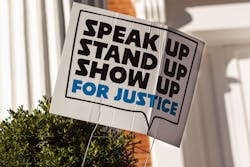Methods to help protect yourself in an age of social unrest
In an age of growing social unrest, you no longer need to be the target of a protest or align yourself with a particular social cause to be a victim. Recent public protests in the U.S.[1] and Canada[2] have had far-reaching consequences for both public servants and private citizens. We have seen the harassment of neighbors to a Supreme Court Justice, a Provincial Premiere and an MP harassed, threatened, and fearful for their safety. So, how do you keep you and your family safe with such unpredictability?
Local Intelligence – Know Your Surroundings
If protestors or self-described “vigilantes” are unable to gain access to the main subject of their ire, you may find yourself as a target of opportunity simply due to your geographic proximity to the subject’s residence. It may be something as inconvenient as blocking access to your driveway, or something more destructive like breaking windows or arson if, perhaps, a bumper sticker on your car associates you with a cause they are protesting.
It was the popular action figure G.I. Joe and the 1980’s children’s cartoon of the same name that popularized the phrase “knowing is half the battle.” This is as true in 2022 as it was then. Knowing what, or who, is in your immediate surroundings on a regular basis is a good place to begin. Start with getting to know your neighbors. Who lives in the homes or apartments immediately adjacent to your property? Are they political figures, law enforcement officers, medical professionals, or someone who would be willing to check on your children if you are away at the office? Are they individuals you could call for help or people who may be the subject of protests?
Digital Footprint – Understand Your Online Presence
You do not need to be famous or a public figure to be at risk. For anyone who thinks they are not important enough to target, just open your mailbox. Our personal information is constantly being bought and sold, often without our knowledge. Data brokers sell your information to third parties to be used in a variety of ways. If you have ever received a magazine you never signed up for, or watched an ad for a product you were just researching, you have been targeted by one of those third parties.
Do you know what information is available about you online? When is the last time you Googled your name or checked your privacy settings on social media? Have you checked to see if your e-mail address has been involved in a data breach and what associated information may have been lost? We recommend https://haveibeenpwned.com/ as one such website to check your e-mail accounts. Do you use a password manager or are you still using the same password across multiple sites?
When you last purchased your home, was there an online presence on a website like Zillow or Trulia that featured photos of the property? In many instances, these photos (as well as blueprints from builder’s websites) remain available long after the home has been sold. While the furniture may have changed, anyone can type in your address and see inside your home, determine its layout, any security hardware, and where valuables may be stored.
Poor digital hygiene increases your risk profile significantly. Activists looking for someone to protest are more likely to target those whose personal information is available online. Those planning something more sinister are only encouraged by being able to look inside your home before they act.
Ways you are Unknowingly Raising your Profile
Did you know that your political affiliation and contributions are publicly available? In Canada and the U.S., both at the state (provincial) and federal level, contributions of certain amounts from donors to political candidates, advocacy groups, or PACs are available for review. Consider the current situation in the United States over abortion. As an example, the top donors to Planned Parenthood in Virginia are easily available online.[3] Donor names and amounts are available at the click of a button, and you can even map donors by zip code on the same website.
Even purportedly confidential donations may be made public. A list of more than 92,000 donors to the Canadian Freedom Convoy that used GiveSendGo were shared by activists to “journalists and researchers.” Canada’s National Observer cross-referenced the data with public records, social media accounts, and news media and identified several of these donors.[4]
Appropriate Security Response
Not everyone needs or can afford armed agents standing outside their homes 24/7. Much like the adage, “you don’t have to be the fastest when outrunning a bear, just don’t be the slowest” the key is to make yourself a less attractive target. Consider these areas of personal risk that you can address immediately:
Be aware of your surroundings. Know who and what is going on in your neighborhood. Which cars are normally parked in what locations? What alternate entry and exit points are available if a road is blocked? If you need to leave your home and are unable to go out the front door, are there egress options out the backyard? If something looks out of place, ask a neighbor.
Remember to lock your doors when you leave. Park your cars in your garage. Close the blinds and drapes. Put up signs that say your property is under surveillance even if you do not have any cameras. Do not leave spare keys under the mat.
Do not overshare information on social media. Keep your online profile to a minimum. You do not need to share your opinion on every controversial subject, but if you feel compelled to say something, use an account not tied to your real identity. Donate money through a trust (and if your name is John Doe, do not make the mistake of naming your “anonymous” trust the John Doe Trust).
- Shred all sensitive documents prior to recycling them; use high-powered magnets or physical destruction of hard drives to deny access to your digital files. Do not simply throw them in the trash.
- Review all bills and statements and check credit reports regularly; opt out of unsolicited offers for pre-approved credit cards or other lines of credit. Your phone number is worth more to identity thieves than your social security number/social insurance number.
- When traveling, have your mail held for the duration of your vacation, and do not use unsecured, public Wi-Fi networks. Remember, if anything is free, then you are the product.
Keep your computer and digital devices up to date with the latest firmware, security patches, firewall, and antivirus software.
Navigating your security response is not difficult, but it does take time. Consider retaining the services of experienced security professionals and insurance providers to give you a comprehensive overview of your risk and how to mitigate it.
Mr. Shultz’s formerly served as a CIA officer with expert investigative and security consulting experience. He specializes in human source intelligence in particularly hard-to-reach and politically sensitive areas such as Eastern Europe, Sub-Saharan Africa, and South America.
Shultz also manages reputation and identity management practices for ultra-high net worth (UHNW) clients and family offices. He is experienced in dealing with the unique challenges of UHNW families such as ransom and extortion response, executive protection and private event security, multi-home physical security and safe room design, international travel guidance and response including medical and disaster evacuation, investor due diligence, private investigations, surveillance and undercover operations, technical surveillance countermeasures (“bug sweeps”), background screening of household staff, cybersecurity planning, and identity theft response.
Shultz holds a B.A. in Psychology & Philosophy from Texas A&M University and is currently studying to earn his Master of Divinity from Southern Baptist Theological Seminary. He holds a Professional Certified Investigator certification through ASIS International and is a Certified Cryptocurrency Investigator.
[1] https://www.msn.com/en-us/news/us/washington-post-kavanaugh-neighbors-say-protesters-are-targeting-residents-calling-them-karens-and-fascists/ar-AAZN7rx
[2] https://www.cbc.ca/news/politics/trudeau-says-no-new-laws-protect-politicians-1.6320895
https://globalnews.ca/news/8535777/calgary-mp-george-chahal-home-protest/
[3] https://www.vpap.org/committees/148191/top_donors/?start_year=2021&end_year=2022
[4] https://www.reuters.com/world/us/leak-site-says-it-has-been-given-list-canada-truck-convoy-donors-after-reported-2022-02-14/
https://www.nytimes.com/2022/02/14/world/canada/canada-trucker-protests-donations.html
https://www.washingtonpost.com/investigations/2022/02/15/american-donors-freedom-convoy-zipcodes/
About the Author

Cody Shultz, PCI, CCI
Director, Investigations & Private Client Protection, Guidepost Solutions
Cody Shultz serves as Director of Private Investigations & Private Client Protection at Guidepost Solutions. He oversees and conducts corporate internal investigations, civil and criminal litigation support, regulatory and sanctions response, business intelligence, and investor due diligence.
Mr. Shultz’s formerly served as a CIA officer with expert investigative and security consulting experience. He specializes in human source intelligence in particularly hard to reach and politically sensitive areas such as Eastern Europe, Sub-Saharan Africa, and South America.
Shultz also manages reputation and identity management practice for ultra-high net worth (UHNW) clients and family offices. He is experienced in dealing with the unique challenges of UHNW families such as: ransom and extortion response, executive protection and private event security, multi-home physical security and safe room design, international travel guidance and response including medical and disaster evacuation, investor due diligence, private investigations, surveillance and undercover operations, technical surveillance countermeasures (“bug sweeps”), background screening of household staff, cybersecurity planning, and identity theft response.
Shultz holds a B.A. in Psychology & Philosophy from Texas A&M University and is currently studying to earn his Master of Divinity from Southern Baptist Theological Seminary. He holds a Professional Certified Investigator certification through ASIS International and is a Certified Cryptocurrency Investigator.


